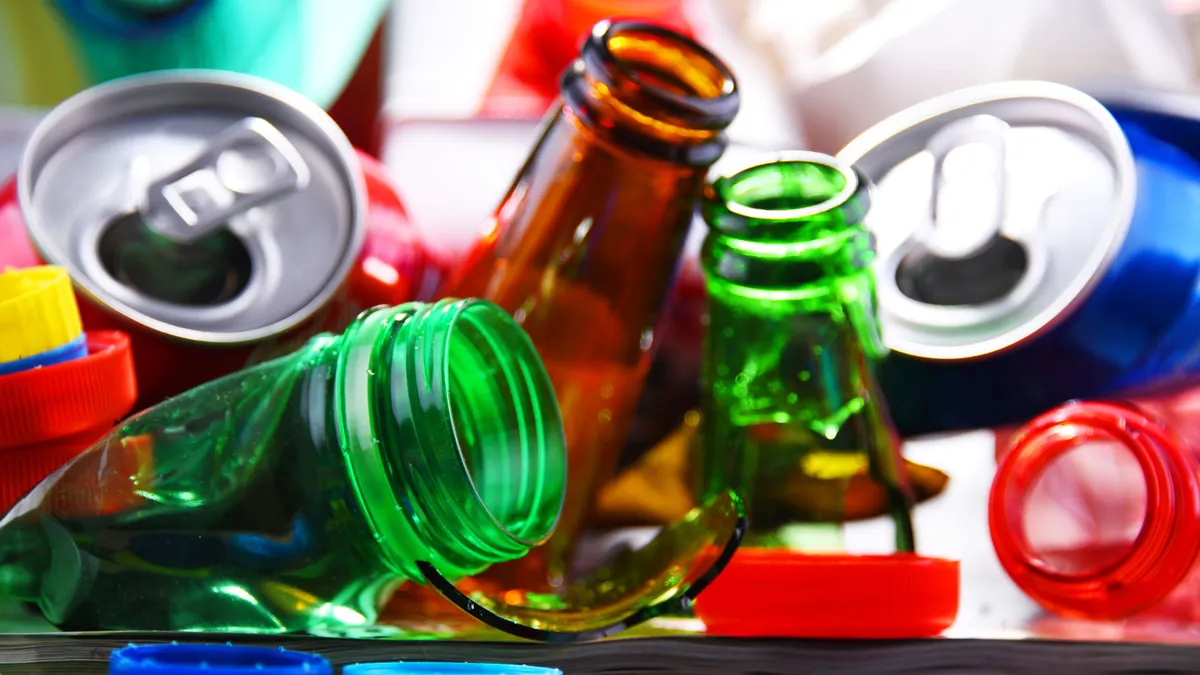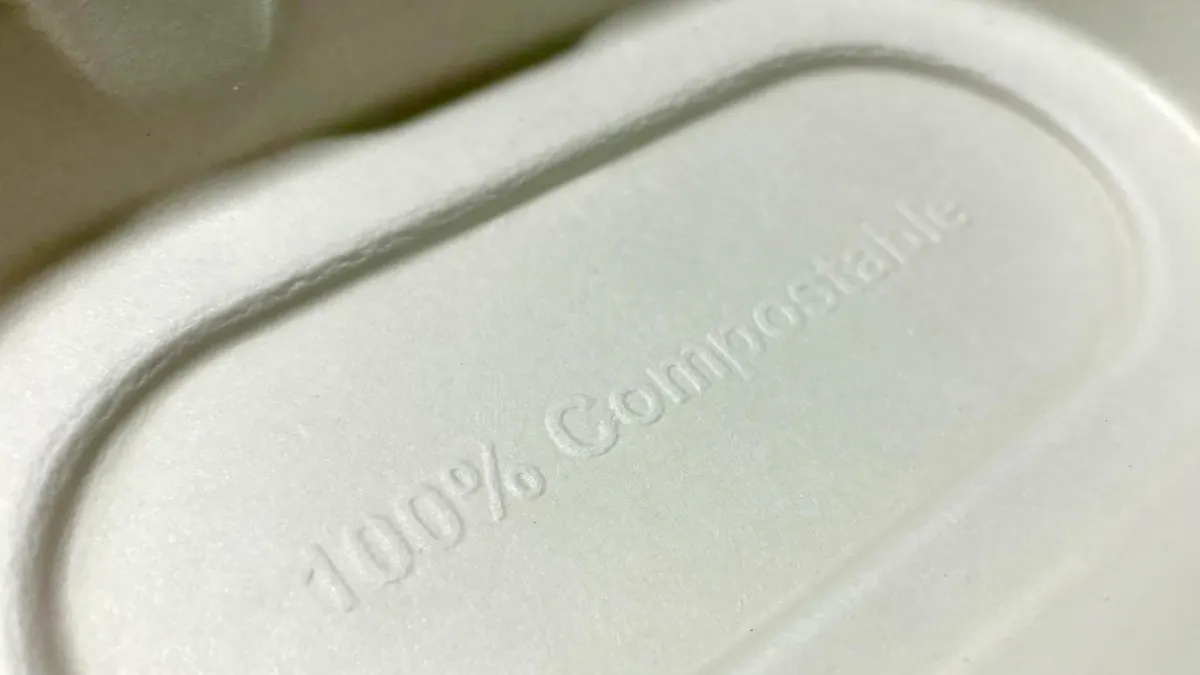Many major consumer product companies are failing to address widespread plastic pollution despite their recycling goals, according to nonprofit corporate responsibility and shareholder advocacy group As You Sow.
The "Waste and Opportunity 2020" report authored by the group finds "no corporate leaders" on plastic pollution reduction.
Alongside its plastics focus, the report centers around U.S. recycling issues and emphasizes the need for more funding. Research and analysis by The Recycling Partnership (TRP) on U.S. recycling rates and the cost of overhauling national infrastructure also factor heavily into the findings. As You Sow cites TRP's research finding around $12 billion needed "to fix the system" and address issues in the sector.
The research looks at the 50 largest consumer-facing companies in sectors including quick-serve restaurants, beverages, retail and consumer packaged goods. Twelve companies received C grades, while 22 received D grades and 15 received F grades. Of those, Walmart, Kroger, PepsiCo, Tyson Foods, Kraft Heinz, and Mondelēz International were the six lowest-ranked companies by size of revenue. The highest grade was a B-, given to Unilever.
As You Sow's report measured company progress using six different metrics: packaging design; reusable packaging; recycled content; packaging data transparency; support for recycling; and producer responsibility. In those areas, As You Sow said company progress was most evident in pledges and goals set around redesigning products to be more sustainable along the established metrics, with most earning A or B grades.
In other areas, As You Sow ranked those companies lower, finding "notably less leadership in the areas of reusable packaging innovation, data transparency and producer responsibility." Overall, companies performed lowest when ranked on their commitment to extended producer responsibility (EPR) regulations.
Multiple companies that earned F grades in the report told Waste Dive they disagreed with As You Sow's findings or pointed to the steps they have taken to incorporate recyclability and waste reduction into their businesses.
In response to the report, a Whole Food Market spokesperson said the company was the first nationally to ban plastic straws and plastic checkout bags, while National Beverage Corp. said 80% of its products come in aluminum cans that "generally contain approximately 73% recycled material."
Hormel Foods said via email the company "will work with As You Sow to help them better understand the sustainable and innovative work we have done surrounding packaging." The email said the majority of the company's packaging does not contain plastic and is recyclable.
A spokesperson for Smithfield Foods said the company has "significantly increased recycling of waste packaging material at our facilities" as part of "zero-waste-to-landfill efforts," with 30% of its U.S. facilities certified as such.
Other companies given a failing grade did not respond to a request for comment as of publishing time.
Study co-author Kelly McBee said in a webinar laying out the report's findings last week that individual companies stand out on certain metrics. She highlighted Nestlé Waters North America's commitment to pay a premium for plastic containing recycled content and Coca-Cola's data transparency on sustainability, which As You Sow deemed better than its peers. Lead author Conrad MacKerron also pointed to Unilever's pledge to cut plastic packaging by 100,000 tons. The organization has previously praised Unilever's plastic reduction, while calling for increased collaboration and funding.
But overall, MacKerron said "examples of leadership were sparse." The authors offered advice for how companies might improve, with McBee highlighting a report recommendation that companies donate up to 1% of their annual revenue to improving recycling infrastructure, which she said was key to giving companies the space to meet any goals they do set. The authors also singled out the "failure of an organized and funded plan to recycle flexible packaging," including items like pouches, sachets and films. Other suggestions included incorporating higher levels of recycled content in products and matching packaging design to available recycling systems.
Several groups reviewed the report's findings, including TRP, the Ellen MacArthur Foundation's New Plastics Economy initiative, and the World Wildlife Fund. As You Sow credits both TRP and Closed Loop Partners (CLP) as being "top performers" in their focus on public-private partnerships and seeking to address enduring issues within the recycling system.
During the webinar, TRP CEO Keefe Harrison called for "broad stakeholder engagement" and said her organization works with businesses to meet their sustainability goals, taking an "insist and assist" approach.
Apart from infrastructure funding and sustainability goals for businesses, the report also highlights newer endeavors prioritizing reusability. Sander Defruyt, who leads the New Plastics Economy initiative, called for an uptick in innovation. "We do need to see much, much more piloting," he said on the webinar, adding there are "a lot of things to try out and to learn."
One company Defruyt singled out was TerraCycle's Loop, which offers a reusable and refillable shopping system. MacKerron similarly pointed to Loop and Algramo as efforts that "offer real hope for scalable delivery." The Algramo project, a reusability initiative, is expanding in the United States after an investment from CLP.
Neither the Consumer Brands Association nor the Association of Plastic Recyclers, both of which represent or have worked with multiple brands mentioned, responded to a request for comment.
A spokesperson for the American Chemistry Council (ACC) directed Waste Dive to the plastics trade organization's official statement on the report. Keith Christman, managing director of ACC’s Plastics Division, said the group has "set goals for all U.S. plastic packaging to be recyclable or recoverable by 2030 and to be re-used, recycled or recovered by 2040."
He added "replacing plastics in packaging with common alternatives would be a big step in the wrong direction" and said the focus should be on modernizing recycling infrastructure and other "circularity" efforts rather than doing away with plastics.
With additional reporting by Cole Rosengren
















